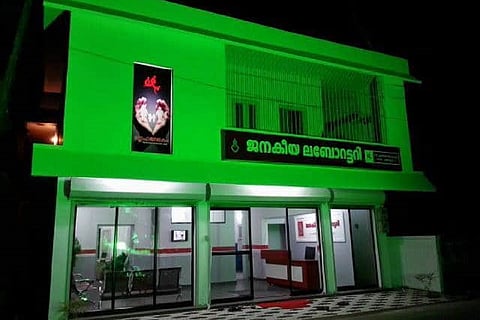

When she got her test result back that Wednesday, Radhika (name changed) made an urgent call to the Janakeeya Laboratory in Pathirappally, a coastal village in Kerala’s Alappuzha. In a few anxious words, she informed the lab about testing positive for the coronavirus ahead of a surgery she was supposed to have. An employee of the Janakeeya lab, she had, in the days preceding this, come in contact with hundreds of people visiting the lab.
After Radhika made the phone call that day – July 15 – the lab was shut and 10 more employees got tested. Three of them were found to have COVID-19 too. Frantic calls were then made to 2,123 people who had visited the lab from July 1 to 15.
Now, half a month has passed and scores of tests have been done. The people running the Janakeeya lab and health workers of the Mararikulam South and Aryanad panchayats (that Pathirappally stretches over) are finally getting some sense of relief as no one else tested coronavirus positive. None of the 2,123 people contracted COVID-19 – perhaps because all the lab employees as well as the people who came in for various medical tests had been wearing masks.
The incident, first reported in The Indian Express, once again underlines the importance of the simple act of wearing masks and how it can end up preventing infection and even saving lives.
It was last month that a study found that two coronavirus positive hairstylists at an American salon broke the chain of transmission of the virus simply because they wore masks. By the time the hairdressers were found to be coronavirus positive, they had interacted with 139 clients, none of whom were found to have COVID-19.
“We have been taking these precautions ever since the outbreak of COVID-19 began in Kerala,” says Binumon TJ, a core member of the Snehajalakam Palliative Care that runs the Janakeeya lab. “No one coming to the lab is allowed to enter without wearing a mask. We have put a board outside with this message. Hand sanitisers are also provided at the entrance. The staff also wears masks and gloves all the time, and would sanitise their hands every half an hour.”
The source of the disease in the lab, however, was not Radhika, but another employee who had come in contact with a relative from the Chellanam harbour in Ernakulam where a major cluster of COVID-19 has been reported. All four employees who tested positive used to spend their lunch hours and break time together without wearing masks.
“Family members of the four employees – spouses and children -- have also tested positive,” Binumon says. None of the other employees in the air-conditioned lab got the disease because they kept physical distance and wore masks, he adds.
“After Radhika informed us that she had tested positive, we immediately contacted the health department. We had recorded the contact details of all the people who came to the lab and all 2,123 of them were asked to go into quarantine. If anyone showed symptoms, they would be tested. But some of them were too anxious to wait for the symptoms and took antigen tests. No one tested positive. At the end of 14 days of quarantine, no one else was infected,” Binumon shares.
The lab and Snehajalakam Palliative Care were founded seven years ago. “Lab tests come at a high price and not everyone can afford it. We decided to charge one-third the price of the other labs – just enough to break even, continue paying the staff, buying the reagents and to cover the cost of running the lab,” Binumon says.
Though it started off as a venture of the Communist Party of India (Marxist), people of all political parties joined the core team and the decision-making body. They also set up the Janakeeya Bakshana Shala, a restaurant started two years ago that has been lauded for offering food free of cost and asking only voluntary payment for charity work. When the COVID-19 outbreak happened there, the same team began supplying food to general hospitals and COVID Care Centres free of cost.
“Several lakhs of rupees come to the charity box every year and it is through the contribution of people that we are able to keep running these ventures. Even in the beginning, the lab could be launched because one person agreed to set up the machines and another provided a building to run it,” says Binumon.